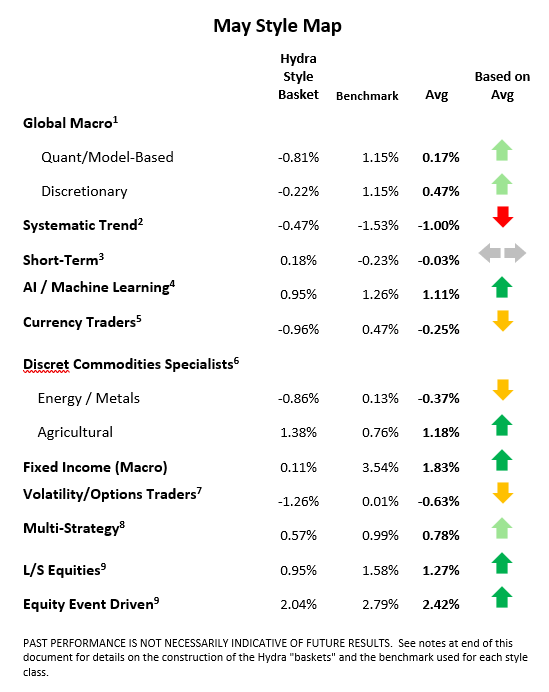Kettera Strategies Heat Map - May 2020
Discretionary Macro
While we often see a wider variance in returns vs Quant Macro, this month returns were truly scattered across the spectrum. Predictably, equity beta directional exposure – perhaps followed by yield curve spread trades - appeared to be the key determinant(s). We did also note that those discretionary strategies with greater commodities exposures also tended not to do as well.
Quant Macro
These programs appeared to follow the patterns of their systematic trend brethren (see below): Positive performance in equities and bonds, outweighed by losses elsewhere. But in different markets and for different reasons. Currencies were the biggest loser for more systematic macro programs. The challenge was keeping up with changing economic releases and estimates, as economies showed signs of recovery than before.
Systematic Trend Programs
This category sustained a “give-back” month. Generally speaking, the vast majority of these programs made gains in long equities index positions and short fixed income markets, but surrendered these profits (and then some) at the hands of currency and commodities markets.
Short-Term
The bottom line for ST programs was that the closer to a longer-term trend follower you were, the less profitable you likely were. Two programs that fared particularly well have an ‘intraday to two-day’ average trade period, with ST breakout models to thank for profits (mostly in the precious metals). Some other, veteran programs with longer holding periods were less fortunate – with some losing in just about every market sector.
Commodities
While most agricultural markets were flat and unexciting, many of the ag spread programs we track did well. Energy traders focused on crude oil tended to face some challenges, while nat gas traders - especially the European NG markets – did much better.
Equities
While nothing close to April, most managers and styles did reasonably well in May. All equities style buckets that we track were positive. Event driven strategies, once again, appeared to be the standout.

**********
Footnotes:
For the “style classes” and “baskets” presented in this letter: The “style baskets” referenced above were created by Kettera for research purposes to track the category and are classifications drawn by Kettera Strategies in their review of programs on and for the Hydra Platform. The arrows represent the style basket’s overall performance for the month (e.g. the sideways arrow indicates that the basket was largely flat overall, a solid red down arrow indicates the basket (on average) was largely negative compared to most months, etc.). The “style basket” for a class is created from monthly returns (net of fees) of programs that are either: programs currently or formerly on Hydra; or under review with an expectation of being added to Hydra. The weighting of a program in a basket depends upon into which of these three groups the program falls. Style baskets are not investible products or index products being offered to investors. They are meant purely for analysis and comparison purposes. These also were not created to stimulate interest in any underlying or associated program. Nonetheless, as these research tools may be regarded to be “hypothetical” combinations of managers, hypothetical performance results have many inherent limitations, some of which are described below. No representation is being made that any product or account will achieve profits or losses similar to those shown. In fact, there are frequently sharp differences between hypothetical performance results and the actual results subsequently achieved by any particular trading program. One of the limitations of hypothetical results is that they are generally prepared with the benefit of hindsight. In addition, hypothetical trading does not involve financial risk, and no hypothetical trading record can completely account for the impact of financial risk in actual trading. There are numerous other factors related to the markets in general or to the implementation of any specific trading program which cannot be fully accounted for in the preparation of hypothetical performance results and all of which can adversely affect actual trading results.
Benchmark sources:
1-The Hedge Fund Intelligence Global Macro Index and HFI Currency Index
2-The Societe Generale Trend Index and SG CTA Index
3-The Societe General Short-term Traders Index: (same link as above)
4-The Eurekahedge AI Hedge Fund Index
5-The BarclayHedge Currency Traders Index and BTOP FX Traders Index
6- S&P GSCI Metals & Energy Index and S&P GSCI Ag Commodities Index
7-The CBOE Eurekahedge Relative Value Volatility Hedge Fund Index
8-The Eurekahedge-Mizuho Multi-Strategy Index: (See above)
9-The Eurekahedge Long Short Equities Hedge Fund Index: (See above)
10-Blend of BarclayHedge Equity Market Neutral Index with Eurekahedge Equity Mkt Neutral Index (see link above)
Indices and other financial benchmarks shown are provided for illustrative purposes only, are unmanaged, reflect reinvestment of income and dividends and do not reflect the impact of advisory fees. Index data is reported as of date of publication and may be a month-to-date estimate if all underlying components have not yet reported. The index providers may update their reported performance from time to time. Kettera disclaims any obligation to verify these numbers or to update or revise the performance numbers.
***
The views expressed in this article are those of the author and do not necessarily reflect the views of AlphaWeek or its publisher, The Sortino Group
© The Sortino Group Ltd
All Rights Reserved. No part of this publication may be reproduced, stored in a retrieval system or transmitted in any form or by any means, electronic, mechanical, photocopying, recording or scanning or otherwise, except under the terms of the Copyright, Designs and Patents Act 1988 or under the terms of a licence issued by the Copyright Licensing Agency or other Reprographic Rights Organisation, without the written permission of the publisher. For more information about reprints from AlphaWeek, click here.








